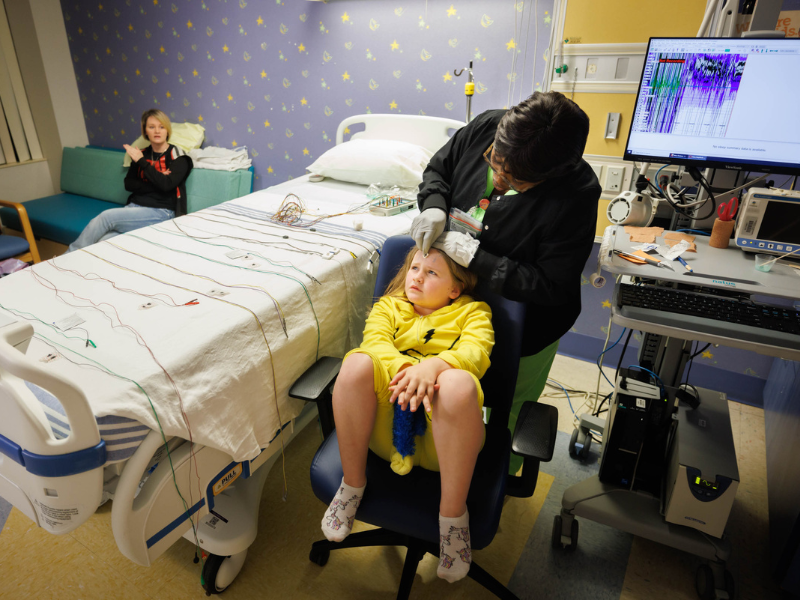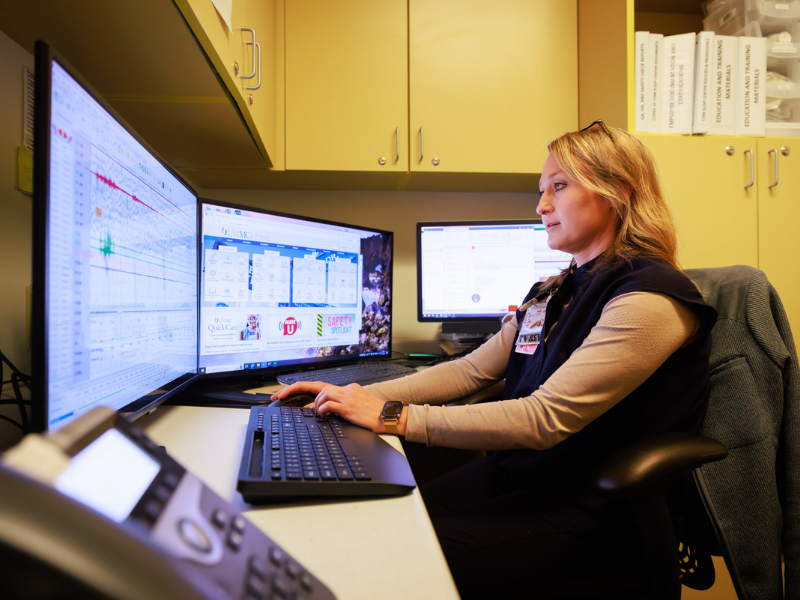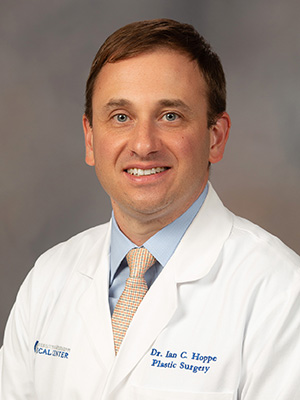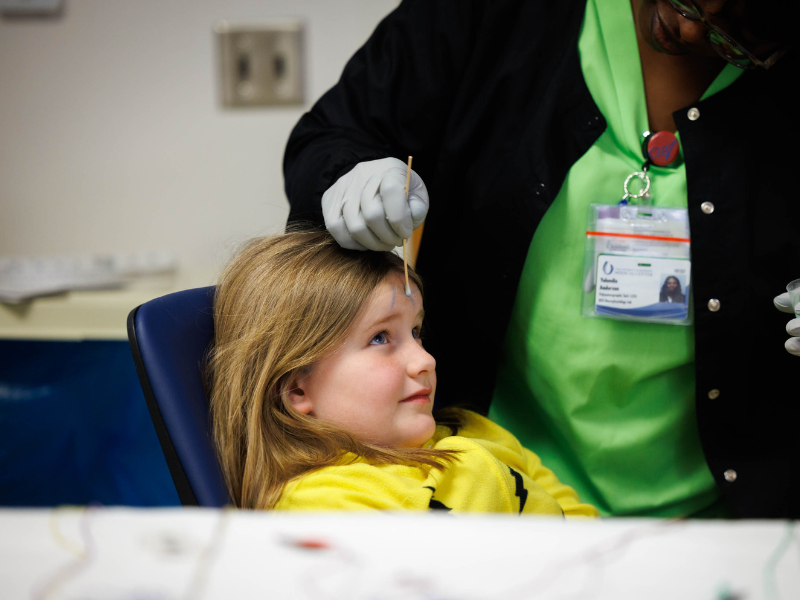By: Annie Oeth, UMMC
Photos By: Joe Ellis/ UMMC Communications

Yolandia Anderson, a polysomnographic technician, preps patient Naevia Dixon, 7, for a sleep study in the Pediatric Sleep Clinic in Batson Tower.
The Children’s of Mississippi Sleep Center is the state’s only pediatric sleep center accredited by the American Academy of Sleep Medicine.
“We’re here as a resource to physicians and families to find answers,” said Dr. Vignesh Nayak, assistant professor of pediatric pulmonology and sleep medicine and the Children’s of Mississippi Sleep Center medical director. “As a comprehensive sleep center for children, we have five private rooms and provide sleep studies six nights a week for patients as young as newborns to adolescents.”
Sleep is essential for proper growth and development, Nayak said. “Children who are not getting enough quality sleep are affected physically, emotionally and mentally. They will be drained and will not be able to concentrate well. REM sleep is absolutely important when children are growing and developing.”
Making sure children can breathe well while sleeping helps them sleep better and puts parents at ease. Sleep studies at the Children’s of Mississippi Sleep Center are the first step in making that care possible.
In the past year, more than 500 pediatric patients have had sleep studies performed at the center, said Robert Mashburn, manager of pediatric respiratory therapy, neurophysiology and the sleep center.
“Without the Children’s of Mississippi Sleep Center, families would have to travel out of state to get the care a certified children’s sleep center provides,” said Lindsey Kirkland, nursing supervisor of the center.
The center is able to provide sleep studies to children with complex medical conditions including those who use a ventilator or have a tracheotomy. Other patients may have night terrors or REM sleep behavior disorder, causing them to physically act out their dreams, which could be dangerous.
Some children, like adults, may need sleep studies for obstructive sleep apnea. Ear, nose and throat patients and children who have anatomical abnormalities, such as cleft lip, cleft palate or micrognathia, a condition where the jaw is smaller than usual. may need sleep studies to evaluate the need for surgical treatment.
Insomnia, narcolepsy and circadian rhythm problems can also be diagnosed and treated through the center.
Comprehensive sleep evaluations and treatments for sleeping disorders are provided for children from newborns to adolescents, and a full range of educational, therapeutic, medical, non-surgical and surgical treatment options are available. Medical specialties that often rely on sleep studies include plastic surgery, otolaryngology (ENT), complex care, pulmonology, neurology/neurosurgery and many more.
For sleep studies, patients and parents arrive at about 7 p.m., receive room assignments and learn more about the sleep study process. Then sensors are applied to patients, with placement depending on the studies done.
Often these sensors are placed on the head, legs, chest and arms, and EEGs, which measure electrical activity in the brain, and EKGs, which measure electrical signals in the heart, can also be done as part of a sleep study. Specific daytime sleep studies are also provided when indicated to test for problems such as narcolepsy and hypersomnia.
The sleep center also provides sleep studies for inpatients at the state’s only children’s hospital.
“If there is a question about a patient’s sleep, having a sleep study while in the hospital will provide answers so any problems can be addressed,” said Brady Holder, director of respiratory care and pulmonary services at Children’s of Mississippi, “or that patient can be discharged with confidence.”
The center’s team also includes four full-time night techs, one PRN night tech and one PRN scoring tech. During the day, scoring, the process of analyzing information from a patient’s sleep in 30-second increments, provides the information physicians use in diagnosing and treating patients.
The center is also helping further pediatric sleep medicine by offering a fellowship.
Dr. Ian Hoppe, associate professor of plastic surgery, who leads the Stephanie and Mitchell Morris Center for Cleft and Craniofacial Research and Innovation, said sleep studies are an important part of his practice.
“It is crucial to have access to efficient and accurate sleep studies in pediatric plastic surgery,” he said. “Oftentimes these studies can determine if an infant or child needs surgery to correct an anatomical problem that may be affecting their breathing or feeding. Dr. Nayak and his team at the sleep center make obtaining these studies seamless, resulting in improved patient care and outcomes. Having the sleep center at Children’s has dramatically improved this process, and patients like the familiar surroundings and process.”
Among Children’s of Mississippi Sleep Center patients is Naevia Dixon of Hamilton, who had breathing problems while sleeping.
“We had a great experience,” said her mom, Savannah Poe. “Everyone on staff was really friendly and knowledgeable. When we had questions about what they were doing, they were glad to answer them, and that made us both feel comfortable and put us at ease.”




